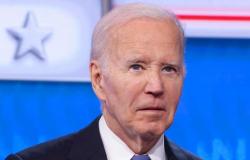The wars in Ukraine and Gaza, as well as the relationship with China and the future of NATO, will creep into Thursday’s televised duel between Joe Biden and Donald Trump, two presidential candidates with diametrically opposed visions and personalities.
The 81-year-old Democrat remembers that he met Golda Meir, the first woman to lead Israel, and boasts that during her mandate the United States “returned” to the international scene after the years of isolationism of Republican Donald Trump (2017 -2021).
But the latter insists that the United States has never been so disrespected. He alleges an “invasion” of migrants in a world, according to him, “on fire”, from Ukraine to the Middle East.
This is the summary of their positions on some important issues, with less than five months left until the presidential elections on November 5.
– Support for Ukraine –
The US president led a coalition of countries supporting Ukraine following the Russian invasion in February 2022. He personally visited kyiv in 2023.
His strategy is to oppose the sending of ground troops but provide massive support to the country so that it can defend itself against Vladimir Putin’s Russia, whom he calls a “brutal tyrant.”
On the contrary, the 78-year-old tycoon, who in the past said he was an admirer of Putin, used his influence over Republicans in Congress to block for months a package of $61 billion in military aid for kyiv. In the end she was adopted.
Trump claims that if he wins the election, he will end the war. “I will solve this before I enter the White House, as president-elect, I will solve it. It has to stop,” he said during a recent rally. And he added: “Putin would never have done that with me.”
– The war in Gaza, Iran –
Along the same lines, Trump assures that the attack by commandos of the Palestinian Islamist group Hamas against Israel would not have occurred if he were in command in the White House.
“There would never have been an October 7 in Israel, ever,” he said at the rally.
The conservative accuses Biden of having abandoned Israel, even though the president has shown almost unwavering support since the start of the war beyond his reservations about the strategy of Israeli Prime Minister Benjamin Netanyahu.
The US president also ordered, for the first time, direct US involvement in the defense of Israel during Iran’s April 13 attack.
Donald Trump accuses Joe Biden of having allowed Iran, a sworn enemy of the United States, to “get rich” despite sanctions.
Trump slammed the door on the major power nuclear deal with Iran signed during Barack Obama’s administration.
– Rivalry with China –
As for China, both consider the country the main strategic rival of the United States and in some aspects Biden applied the same protectionist economic policy as his predecessor.
The Democratic president is in favor of stabilizing the relationship with Beijing and managing it in a “responsible” way, while the Republican considers China an enemy and defends a tougher policy.
– NATO –
On this topic the contrast is abysmal.
Biden congratulates himself on restoring US alliances, including within NATO, and Donald Trump threatens to withdraw from the organization.
Biden wants an Alliance “stronger than ever” in response to Russia’s invasion of Ukraine and Trump sparked outrage by saying he would encourage Vladimir Putin to “do whatever he wants” if a NATO member country does not respect its financial commitments to the organization.
– Multilateral or unilateral –
Trump’s first term was marked by his break with multilateral agreements such as the climate agreement, the construction of the first sections of a wall on the border with Mexico to try to prevent the entry of migrants, the imposition of customs tariffs and meetings with leaders sentenced to ostracized by most leaders, such as North Korea’s Kim Jong Un.
With Joe Biden, the opposite occurs: strengthening of US alliances, particularly in the Asia-Pacific.
A veteran of American diplomacy, Kurt Campbell, number two at the State Department, summarizes the difference in approach this way: the Biden administration is “determined to work with allies and partners,” while Trump is an adherent of “America first.” .
lb/aem/erl/nn
THE NATION






